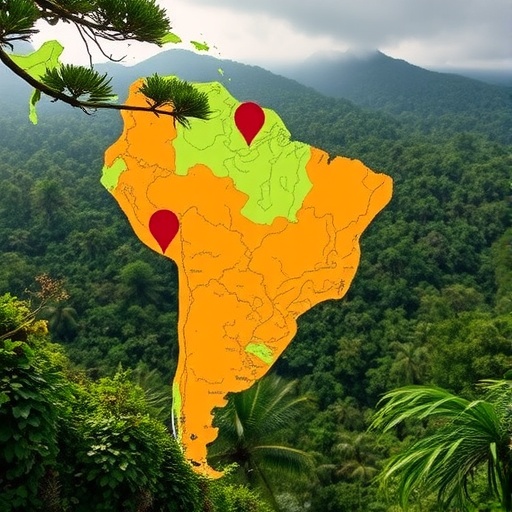ARLINGTON, Va. — A groundbreaking study published in Nature Communications Earth and Environment has unveiled the profound contribution of Afro-descendant communities in the Amazon basin to biodiversity conservation and climate change mitigation. This comprehensive research, conducted across Brazil, Colombia, Ecuador, and Suriname, provides the first statistically robust and spatially detailed evaluation of Afro-descendant lands, revealing their exceptional environmental stewardship. Covering nearly 9.9 million hectares—approximately one percent of the combined land area in these nations—these territories exhibit remarkably low deforestation rates and harbor extraordinary levels of biodiversity and irrecoverable carbon stocks, underscoring their critical global ecological significance.
The research emerged as a pioneering effort to integrate spatial data, statistical modeling, and historical context for a nuanced understanding of how Afro-descendant peoples manage and protect their lands. Despite their substantial demographic presence—nearly one in four people in Latin America identifies as Afro-descendant—these communities have historically been marginalized within international environmental dialogues. The study’s authors argue that recognizing and supporting their land tenure rights is not only a matter of social justice but an imperative for effective conservation and climate action.
Afro-descendant territories were found to have deforestation rates substantially below national averages, a phenomenon consistent regardless of whether these lands fell within formal protected areas. In fact, these rates were reduced by 29% within protected boundaries and an even more striking 36% lower outside such zones. The effect was most pronounced at the edges of protected areas, where deforestation dropped by 55%, highlighting Afro-descendant stewardship as a crucial buffer against forest degradation. These reductions in forest loss translate directly into carbon retention, vital for mitigating climate change by maintaining irrecoverable carbon reserves—those carbon stocks that cannot be replaced for at least three decades once lost.
Biodiversity metrics echoed this narrative of exceptional environmental management. More than 56% of Afro-descendant lands rank within the top 5% globally for biodiversity richness, with Ecuador’s Afro-descendant territories comprising an astonishing 99% of these biodiversity hotspots. This concentration reflects long-standing indigenous knowledge systems and culturally embedded sustainable practices that foster complex, resilient ecosystems. Such ecological wealth not only sustains endemic flora and fauna but provides ecosystem services essential to global climate stability and local livelihoods.
One notable aspect of the study is its attention to the cultural heritage linking contemporary conservation practices to the legacies of the transatlantic slave trade. Many Afro-descendant peoples, often descendants of Maroon communities that escaped enslavement, have cultivated “escape agriculture” methods—an adaptive agricultural approach that balances community sustenance with ecological preservation. This system includes sophisticated agroforestry and “food forest” techniques that replicate the structural and functional diversity of natural forests, promoting resilience in the face of climate variability and anthropogenic pressures.
The protective impact of Afro-descendant land management is doubly significant given the lack of formal legal recognition often afflicting these territories. Unlike many Indigenous-managed lands that have seen increasing titling and enforcement, Afro-descendant claims remain tenuous or entirely unacknowledged in several countries, thereby increasing vulnerability to deforestation, illegal resource extraction, and socio-economic marginalization. The study strongly advocates for urgent legal reforms granting secure property rights to Afro-descendant peoples, reinforcing their capacity to steward their ecosystems effectively.
Additionally, the researchers highlight a noteworthy gap in representation, as Afro-descendant leaders and knowledge holders remain underrepresented in global climate and biodiversity platforms, including UN summits such as COP16 and the upcoming COP30 hosted by Brazil. Elevating Afro-descendant voices in these arenas would enrich policy frameworks by incorporating proven community-based conservation models, thus fostering more inclusive and effective environmental governance worldwide.
Experts and community leaders alike emphasize that Afro-descendant stewardship is not merely a relic of the past but a dynamic and ongoing practice. Martha Cecilia Rosero Peña, Ph.D., Social Inclusion Director at Conservation International, underscores that these communities have long acted as stewards of biodiversity without due acknowledgment, and their innovative land management can inform broader conservation strategies. Similarly, Sushma Shretha, Ph.D., director of Indigenous Science, Research, and Knowledge, stresses that Afro-descendant environmental management practices are sophisticated, sustainable, and critical for global conservation success.
From an ecological economics perspective, Angélica Mayolo, former Colombian Minister of Culture and environmental scholar, underscores the urgent need for developing innovative financing mechanisms tailored to the social and economic realities of Afro-descendant communities. These instruments would support sustainable livelihoods while incentivizing conservation, helping to reconcile biodiversity protection with the socioeconomic pressures these populations face in highly biodiverse yet vulnerable landscapes.
Conservation International’s engagement with Afro-descendant communities exemplifies the potential of collaborative research coupled with advocacy and capacity building. Initiatives such as the Afro Women Fellowship Program envisage empowering Afro-descendant women as conservation leaders, thereby embedding community perspectives at the heart of climate action frameworks. These approaches epitomize how equitable inclusion can transform conservation from a top-down mandate into transformative partnerships that honor cultural identity and ecological wisdom.
The implications of this study extend far beyond the Amazon. They challenge prevailing paradigms that often overlook community-driven conservation, highlighting the need to revise global strategies to prioritize land security, participatory governance, and the integration of traditional ecological knowledge. Given the accelerating biodiversity crisis and escalating climate emergencies, leveraging the stewardship expertise of Afro-descendant peoples can catalyze scalable solutions for preserving critical ecosystems worldwide.
In conclusion, this seminal research contributes compelling scientific evidence that Afro-descendant territories in South America are vital strongholds for both biodiversity and climate mitigation. Their sustained protection, underpinned by community-led governance, represents a pragmatic pathway toward achieving the intertwined goals of ecological conservation, climate resilience, and social equity. Future conservation policies and international negotiations must therefore recognize Afro-descendant leadership not only as a moral imperative but as a strategic necessity for global environmental sustainability.
Subject of Research: People
Article Title: Afro-descendant lands in South America contribute to biodiversity conservation and climate change mitigation
News Publication Date: 22-Jul-2025
Web References: http://dx.doi.org/10.1038/s43247-025-02339-5
Keywords: Deforestation, South America, Farming, Biodiversity, Deforestation rates, Sustainable agriculture, Agroforestry




